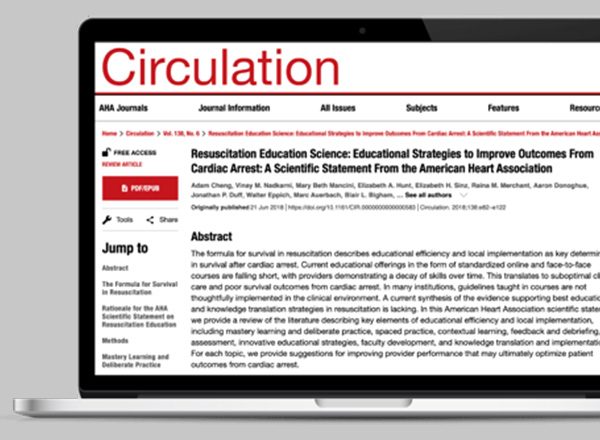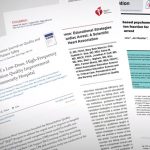In 2018, it was the year educational efficiency stepped into the resuscitation spotlight, being linked to survival after cardiac arrest.1 The origin of this emergence is heavily attributed to the publication of the American Heart Association’s scientific statement: Educational Strategies to Improve Outcomes from Cardiac Arrest.
Now, 2020 is the year that educational efficiency made its debut in the American Heart Association’s Guidelines for Cardiopulmonary Resuscitation and Emergency Cardiovascular Care.
What is fueling the continuous progression of education and its importance in resuscitation science? Making the leap from literature to a guidelines recommendation is no small feat. It takes research, evidence evaluation, and determination of applicability for local implementation. These are the exact attributes that resuscitation education has brought forth in its rise to the top.
One might say the proof was found in the pudding.
It is important that we can delve into this proof. To know it, understand it, and find relevancy for how it best serves our learners and healthcare providers—and their ability to save a life. To help with this endeavor, an interactive evidence library organized by the key tenants of educational efficiency is now available to the public, known as www.LearningRQI.com.
Resuscitation quality improvement has served as the catalyst for bringing the instructional design enhancements of education science to life. Now, we are unveiling how program design can result in a mastery learning model for verified competence and performance. An avenue to create a community of educators in resuscitation science, shifting from compliance to a new standard of care.
To be a part of this journey, visit www.LearningRQI.com to experience the research, evidence, and applicability of resuscitation education science.
This experience includes:
Evidence Library
Literature organized by the key tenants of educational efficiency including mastery learning, deliberate practice, contextualization, feedback, debriefing, and valid assessment.
Design Tool Kits
Instructional design enhancements organized by these same key tenants.
RQI Education Blog
Answers to common inquiries about quality improvement.
References
- Cheng A, Nadkarni VM, Mancini MB, et al; for the American Heart Association Education Science Investigators; and for the American Heart Association Education Science and Programs Committee, Council on Cardiopulmonary, Critical Care, Perioperative and Resuscitation; Council on Cardiovascular and Stroke Nursing; and Council on Quality of Care and Outcomes Research. Resuscitation education science: educational strategies to improve outcomes from cardiac arrest: a scientific statement from the American Heart Association [published online ahead of print June 21, 2018]. Circulation. doi:10.1161/CIR.0000000000000583.









